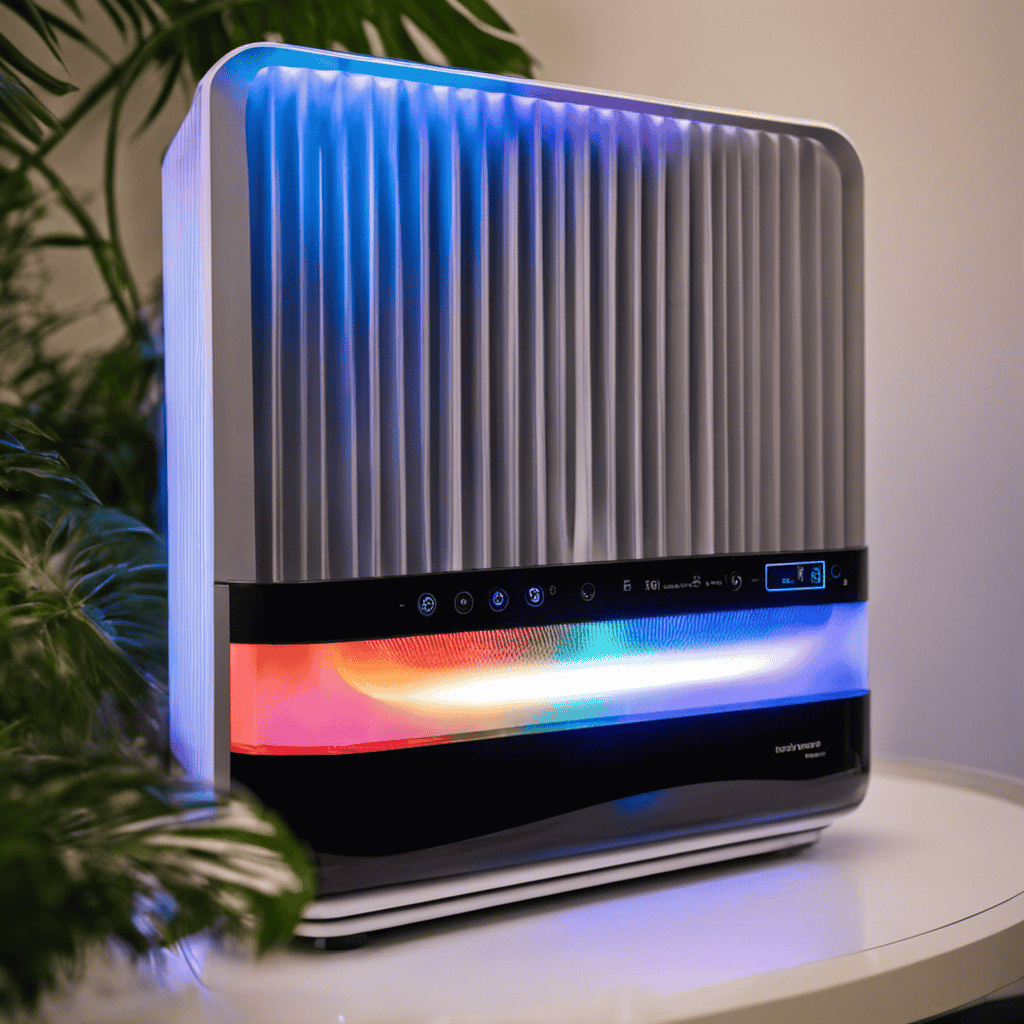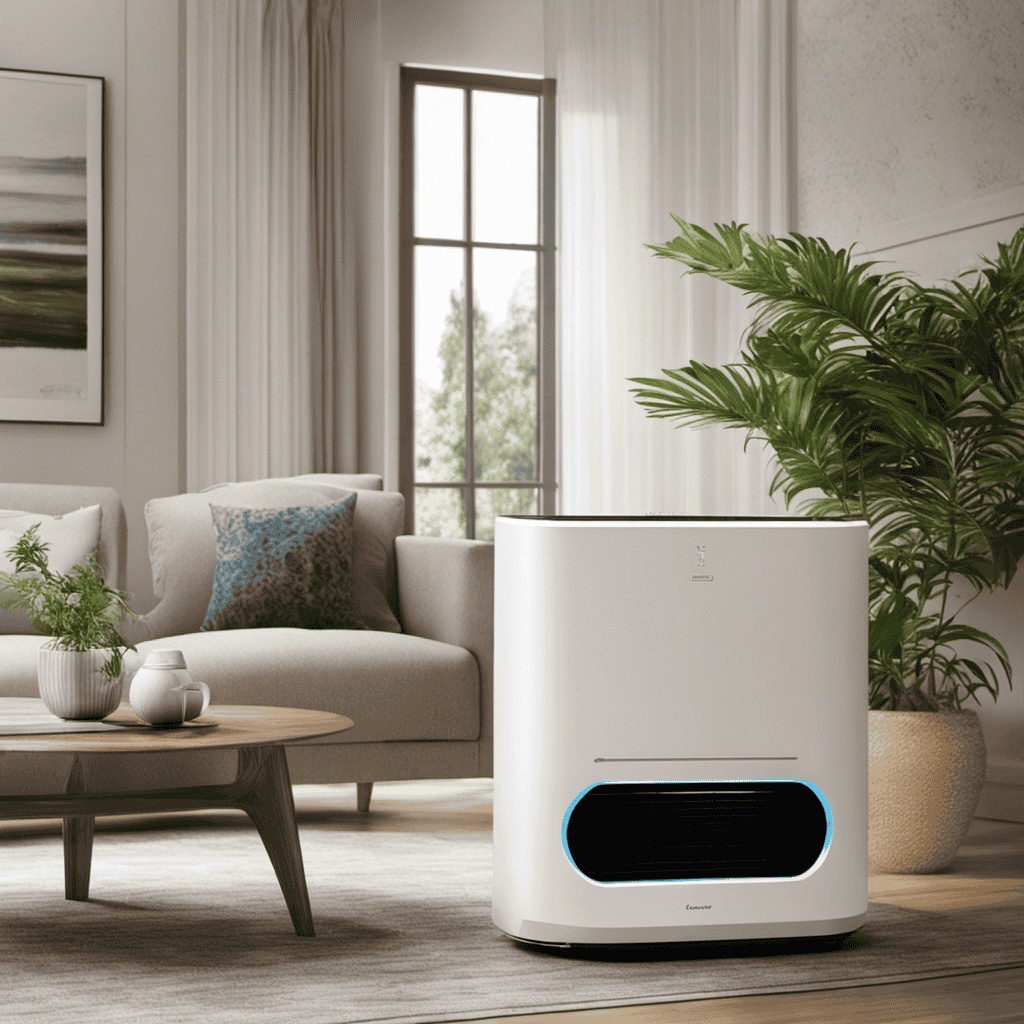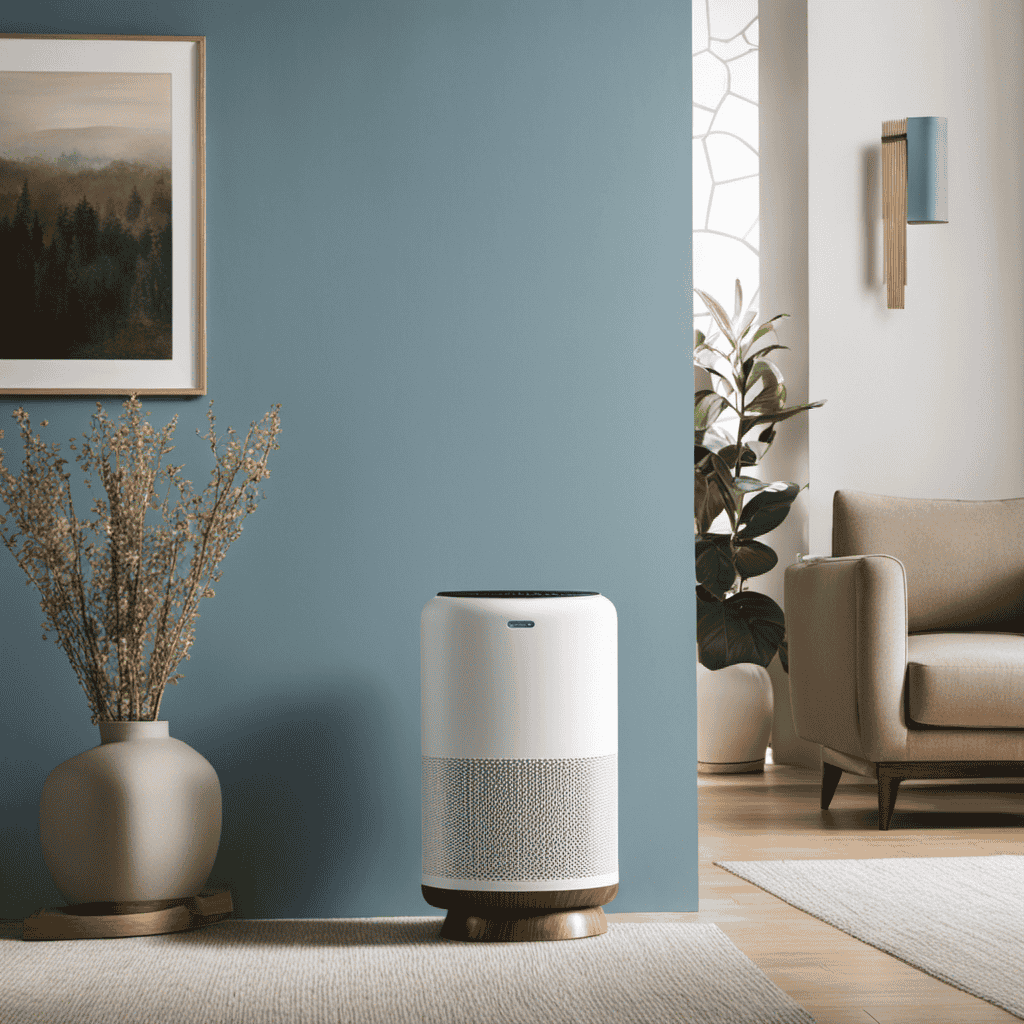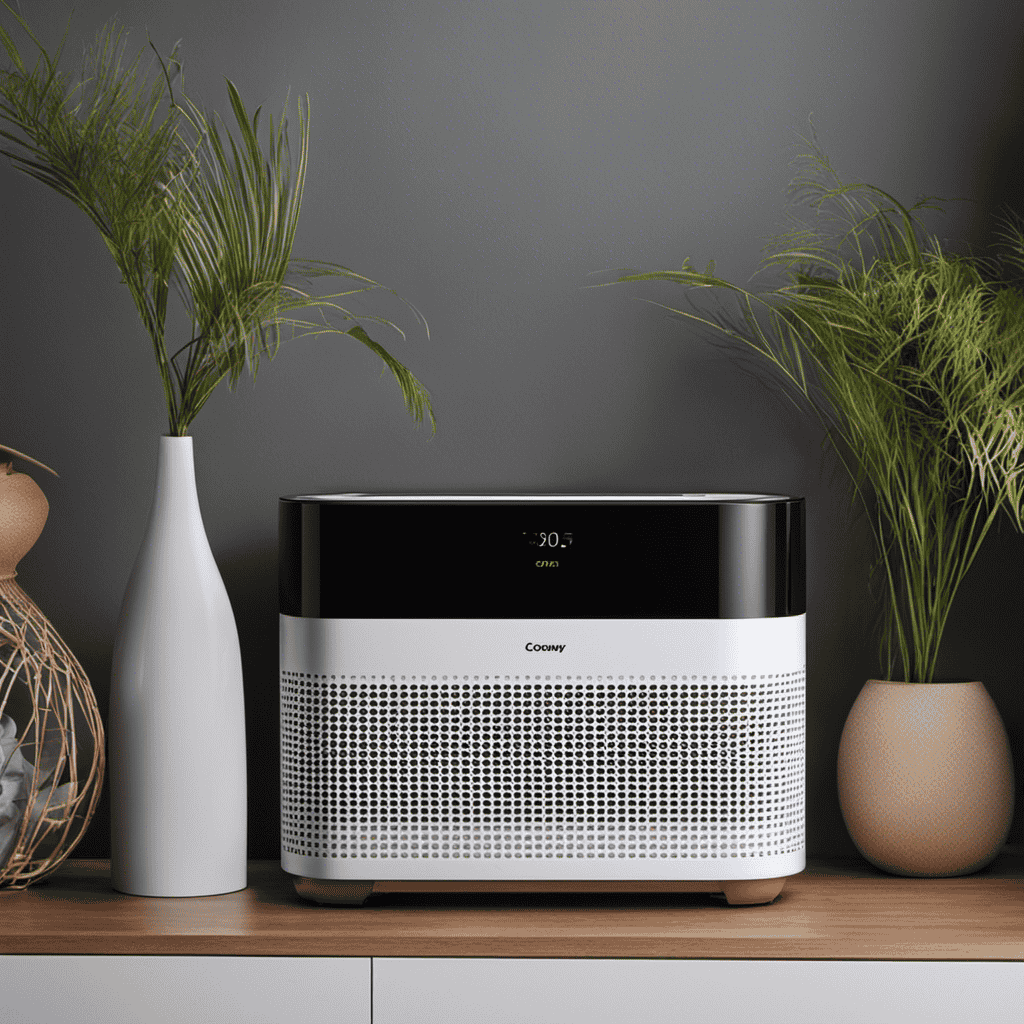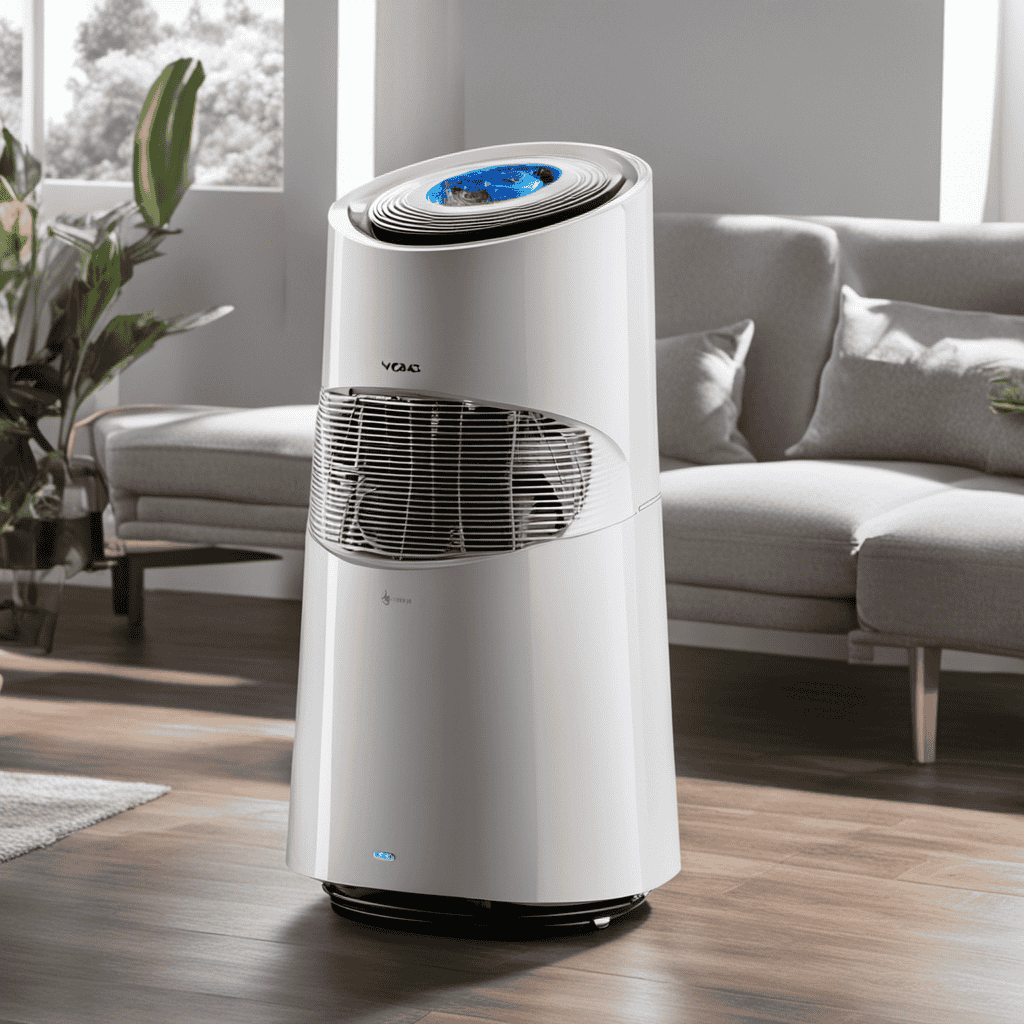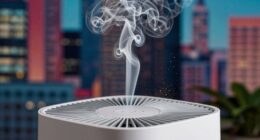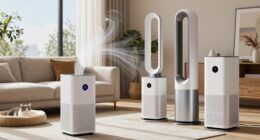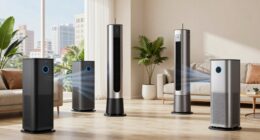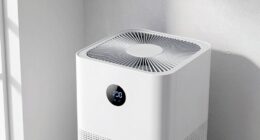Ever curious about the functioning of ionizer air purifiers? Allow me to explain it to you in detail.
In this article, I will explain the science behind ionization and how it helps purify the air in your home. We will explore the benefits of using ionizer air purifiers and how they effectively remove airborne particles.
I will also provide tips on maintenance and compare ionizer air purifiers with other technologies.
Get ready to breathe cleaner, fresher air with a deeper understanding of how these devices work.
Key Takeaways
- Ionizers use electrical charges to remove particles from the air.
- Negative ions are generated by an electronic device within the ionizer.
- Ionizers efficiently capture and remove smaller particles like bacteria and viruses.
- Regular maintenance and care, including cleaning the filter and checking for any malfunctions, are necessary for optimal performance.
The Science Behind Ionization
Ionizers use electrical charges to remove particles from the air, creating cleaner and healthier indoor environments. The ionization process involves the release of negative ions into the air. These negative ions are generated by an electronic device within the ionizer.
When the device is turned on, it emits a stream of electrons, which attach themselves to air molecules, creating negative ions. These ions then attach themselves to airborne particles, such as dust, pollen, and pet dander. The negative ions neutralize the positive charge of these particles, causing them to become heavier and fall to the ground or be attracted to nearby surfaces.
This effectively removes these particles from the air, improving the overall air quality. The ionization process is a scientifically proven method for reducing indoor air pollution and providing a healthier living environment.
Understanding Ionic Air Purification
To understand how it works, you simply need to know that ionic air purification operates by emitting charged particles into the surrounding air. These charged particles, also known as ions, attach themselves to airborne pollutants such as dust, pollen, and smoke. Once attached, the ions become heavy and fall to the ground or are caught by the purifier’s collection plates. This process effectively removes these pollutants from the air, improving its quality.
When it comes to the effectiveness of ionizers, it is important to consider the size of the particles being targeted. Ionizers are most effective at removing smaller particles, such as bacteria and viruses, as they are more easily charged and captured. However, larger particles, like pet dander or mold spores, may not be as effectively removed by ionizers alone. Therefore, it is recommended to use ionizers in conjunction with other air purification methods for optimal results.
| Pros | Cons |
|---|---|
| Efficient at removing bacteria and viruses | Less effective at removing larger particles |
| Silent operation | May produce trace amounts of ozone |
| Low maintenance | May produce a faint smell |
| Energy efficient | May not be as effective in larger rooms |
| Compact and portable | May require regular cleaning of collection plates |
Benefits of Ionizer Air Purifiers
One of the benefits of using ionizer air purifiers is their ability to efficiently capture and remove smaller particles like bacteria and viruses from the surrounding air. This is crucial for maintaining a healthy indoor environment, as these microscopic particles can pose a significant threat to our health.
Ionizers work by emitting negative ions that attach to these particles, causing them to become heavier and eventually fall to the ground or get trapped in the filter. This not only improves the air quality but also reduces the risk of respiratory infections and allergies.
Moreover, ionizer air purifiers are cost-effective in the long run, as they require minimal maintenance and do not rely on expensive filters. Their impact on health, combined with their affordability, makes ionizer air purifiers an excellent choice for anyone looking to improve their indoor air quality and overall well-being.
In the next section, we will explore in detail how ionizers remove airborne particles.
How Ionizers Remove Airborne Particles
If you’re wondering how ionizers remove airborne particles, it’s important to understand that they emit negative ions that attach to these particles, making them heavier and causing them to fall to the ground or get trapped in the filter.
Negative ions are atoms or molecules that have gained an extra electron, resulting in a negative charge. When an ionizer releases negative ions into the air, these ions are attracted to the positively charged airborne particles.
This electrostatic attraction causes the negative ions to attach themselves to the particles, neutralizing their charge and making them heavier. As a result, the particles are no longer able to float freely in the air and are either pulled down by gravity or trapped in the ionizer’s filter.
This process effectively removes airborne particles and improves indoor air quality.
Maintenance and Care for Ionizer Air Purifiers
When using an ionizer air purifier, it’s crucial to regularly clean the filter to ensure optimal performance.
Here are some common problems that may arise with ionizer air purifiers and troubleshooting tips to resolve them:
-
Reduced airflow: If you notice a decrease in airflow, check if the filter is dirty or clogged. Clean or replace the filter as needed to restore proper airflow.
-
Unpleasant odor: If the air purifier emits a foul smell, it may indicate a dirty filter or an accumulation of pollutants. Clean or replace the filter, and if the issue persists, consider cleaning the ionizer plates or contacting customer support.
-
Malfunctioning ionizer: If the ionizer function stops working, check if the ionizer plates are dirty or damaged. Clean or replace the plates, ensuring they are properly aligned.
-
Excessive noise: If the air purifier makes excessive noise, it could be due to a loose or misaligned component. Check all parts, tighten any loose screws, and ensure proper assembly.
Comparing Ionizer Air Purifiers With Other Technologies
Now that we understand how to maintain and care for ionizer air purifiers, let’s compare their effectiveness and cost with other technologies.
When it comes to effectiveness, ionizer air purifiers have their strengths. They work by releasing negative ions into the air, which attach to airborne particles and make them heavy, causing them to fall out of the air. This process effectively reduces pollutants and allergens in the immediate vicinity of the purifier. However, it’s important to note that ionizers may not be as effective in filtering out smaller particles or odors.
In terms of cost, ionizer air purifiers are generally more affordable upfront compared to other technologies like HEPA filters or activated carbon filters. However, they may require more frequent maintenance and replacement of the ionizing plates, which can add to the overall cost over time.
Frequently Asked Questions
Are Ionizer Air Purifiers Safe to Use for People With Respiratory Conditions Like Asthma or Allergies?
I have asthma and allergies, and I’ve found that ionizer air purifiers can be helpful. They remove pollutants from the air, but some people may experience irritation from the release of ozone.
Can Ionizer Air Purifiers Remove Odors From the Air, Such as Smoke or Pet Smells?
Yes, ionizer air purifiers can effectively remove odors from the air, including smoke and pet smells. They improve indoor air quality, making them beneficial for people with respiratory conditions like asthma or allergies.
How Long Do Ionizer Air Purifiers Typically Last Before Needing to Be Replaced?
Ionizer air purifiers typically last for several years before needing replacement. Signs that indicate the need for replacement include decreased performance, failure to remove odors, and a decrease in the effectiveness of air purification.
Do Ionizer Air Purifiers Consume a Lot of Electricity to Operate?
Ionizer air purifiers have both advantages and disadvantages when it comes to electricity consumption. While they generally use less energy than other types of air purifiers, they may still consume a moderate amount of electricity to operate.
Can Ionizer Air Purifiers Effectively Remove Harmful Chemicals or Volatile Organic Compounds (Vocs) From the Air?
Sure, I can answer that. Ionizer air purifiers are incredibly effective at reducing indoor air pollution by removing harmful chemicals and VOCs. They have a significant impact on overall air quality.
How Does the Ionizer in an Air Purifier Contribute to Its Functioning?
The ionizer in air purifier functionality helps to remove airborne particles by charging them with negative ions. These charged particles then attract to positively charged surfaces, effectively removing them from the air. This process can help to improve air quality by reducing pollutants and allergens in the environment.
Conclusion
In conclusion, ionizer air purifiers are the superheroes of clean air.
Their science is mind-blowing, with ionization taking center stage.
These purifiers have the power to zap away all those pesky airborne particles, leaving us with nothing but pure, fresh air.
And the best part? They require minimal maintenance and care.
Compared to other technologies, ionizer air purifiers are in a league of their own.
So, if you want to breathe in the purest air imaginable, look no further than these incredible machines.
